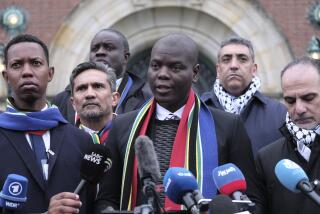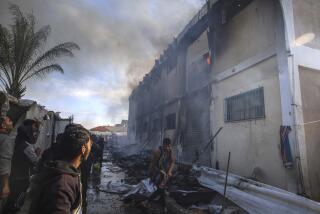Bosnian Serb Is Found Guilty of 1995 Genocide
- Share via
PARIS — A United Nations tribunal found a former Bosnian Serb general guilty of genocide Thursday in the Srebrenica massacre of more than 7,000 Muslims six years ago, a ruling that is the first genocide conviction handed down for war crimes committed in the former Yugoslavia.
Radislav Krstic, who played a central role in Europe’s bloodiest atrocity since World War II, was sentenced to 46 years in prison. The 53-year-old Krstic is the highest-ranking officer convicted by the International Criminal Tribunal for the Former Yugoslavia, and the verdict ratified allegations by prosecutors and the international community that top Bosnian Serb leaders committed genocide.
“You are guilty of the murder of thousands of Bosnian Muslims,” said Judge Almiro Rodrigues of Portugal as he read the verdict to Krstic. “You are guilty of the incredible suffering of the Bosnian Muslims. . . . Knowing that the women, children and old people of Srebrenica had been transferred, you are guilty of agreeing to the plan to conduct mass executions of all the men of fighting age. You are therefore guilty of genocide, Gen. Krstic.”
Krstic led a meticulously brutal operation by troops who invaded a U.N.-protected Muslim enclave in July 1995, rounded up men and boys and executed them with hand grenades and machine guns. A soldier involved in the carnage testified that the killers fired so many rounds that their fingers hurt.
Krstic, an angular, haunted-looking man who uses crutches because his leg was maimed by a land mine, became the first officer convicted in a massacre that horrified the world.
In the aftermath of the bloodshed, U.S. and European leaders expanded efforts to bring an end to the Bosnian conflict, and the Dayton peace accord was signed months later.
U.N. officials later acknowledged that outgunned, outmanned peacekeepers failed to prevent atrocities. Both France and the Netherlands are still investigating the role their forces played in a tragedy that could have been avoided.
Srebrenica became a symbol of a region’s pain and the world’s shame, Rodrigues said in a verdict notable for vivid images and quotes from philosophers.
“Srebrenica: the name of a town which has become synonymous with the conflict that devastated the former Yugoslavia,” the judge said. “A name which conjures up images that one would not prefer to see: men separated from their families; men taken prisoner; men never to be seen again . . . corpses piled up in mass graves; corpses with their hands tied or their eyes blindfolded; frequently dismembered corpses as well. Unidentified corpses. Corpses.”
The success of the prosecution team, which was led by Mark Harmon, a former U.S. federal prosecutor from California, is likely to accelerate the hunt for the court’s most-wanted fugitives: Radovan Karadzic and Gen. Ratko Mladic.
Former Yugoslav President Slobodan Milosevic, indicted for war crimes in the province of Kosovo, was sent to the tribunal at the end of June. Prosecutors say they may expand his indictment to include alleged war crimes in Croatia and Bosnia-Herzegovina.
Karadzic was the Bosnian Serb political leader during the conflict in the former Yugoslav republic, and Mladic was his chief military man. Both are under indictment but remain at large, protected by large contingents of armed men.
“We believe them to be in the Bosnian Serb entity” within Bosnia, said Florence Hartman, a spokeswoman for the prosecution, in a telephone interview. “They are under protection. They still have influence in that region.”
The court’s ruling cited at length evidence in Krstic’s nearly 1 1/2-year trial that implicated Mladic as the mastermind of the massacre.
U.S. and European peacekeepers are stepping up their pursuit of the two men, a State Department spokesman said Thursday. U.S. troops arrested Krstic in an ambush in Bosnia about two years ago.
“The judgment sends a strong message that genocide will not be tolerated and the perpetrators will be brought to justice,” said State Department spokesman Richard Boucher. He said the ruling “underscores the necessity of apprehending others accused of these horrendous crimes, most notably Ratko Mladic and Radovan Karadzic, and we’re redoubling our efforts to apprehend them.”
In The Hague on Thursday, Krstic’s lawyer said he would appeal. Krstic has been described by some observers as a professional military man whose manner was restrained compared to that of swaggering, thuggish colleagues in the Bosnian Serb forces. During his trial, he did not deny that the killings occurred but said he was powerless to stop them.
Krstic’s lawyer also argued that the atrocities did not constitute genocide because women, children and the elderly were spared. International law defines genocide as acts intended to destroy “in whole or in part a national, ethnic, racial or religious group.”
The court disagreed. Although the judges found that Mladic gave the orders, they also held Krstic responsible. He was the deputy commander of the dreaded Drina Corps of the Bosnian Serb army and became commander of the corps, second in the area only to military chief Mladic, on July 13, 1995, the day the massacre began.
The massacre came at the end of years of fierce fighting between Serbs and Muslims around Srebrenica, a mining town that the U.N. in 1993 designated as a safe haven guarded by peacekeepers. The Bosnian Serbs tightened their siege and finally invaded with about 15,000 men, overwhelming a paltry force of 110 Dutch soldiers whose requests for NATO airstrikes went unheeded.
The killers targeted all men and boys deemed to be of fighting age. Many victims were part of a column of thousands of people who tried to flee through the woods.
The five-day orgy of killings was carried out in places including a meadow, a soccer field, a school and a warehouse, where as many as 1,500 men died, some after being forced to sing Serbian songs. The court found that between 7,000 and 8,000 victims were killed.
Evidence also featured radio intercepts of conversations between military commanders, including an exchange in which an aide asked Krstic’s guidance in disposing of “3,500 packages”--a code word for corpses.
In addition, aerial imagery supplied by U.S. intelligence agencies identified the killing fields and the sites of mass graves. Thousands of the bodies have yet to be found because, as shown by the prosecution, bulldozers were used in a cover-up in which corpses were moved to new burial sites.
Krstic was convicted of other crimes, including the forced deportation of 30,000 survivors. The prosecutors had requested a life sentence; the more moderate 46-year sentence may reflect the judges’ view that Krstic did not plan or order the crimes, some observers said. Previously, the court acquitted two suspects of genocide.
In Bosnia on Thursday, survivors wept as they watched live television coverage of the court rendering its 255-page judgment. Some women were angry because they felt the punishment should have been harsher.
“Let him go and come back among us. We will give him a verdict,” Behara Hasanovic told Associated Press. “For 10,000 of our sons, only 46 years! His people have ripped my son from my arms.”
More to Read
Sign up for Essential California
The most important California stories and recommendations in your inbox every morning.
You may occasionally receive promotional content from the Los Angeles Times.













